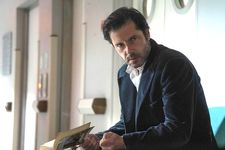In the first instalment with Melvil Poupaud (who is being honoured at the French Institute in New York next month) we discuss the dark side of Arnaud Desplechin’s Brother And Sister (Frère Et Sœur), Mathieu Amalric in A Christmas Tale and Kings And Queens, Mia Hansen-Løve’s One Fine Morning, a touch of François Ozon’s By The Grace Of God, James Joyce’s The Dead, Eric Rohmer’s A Summer’s Tale, and Woody Allen’s Coup De Chance with Lou de Laâge, Niels Schneider and Valérie Lemercier.
In Desplechin’s latest return to the bigger-than-life Vuillard family, screenplay with Julie Peyr (Deception, Ismael's Ghosts, My Golden Days, Jimmy P: Psychotherapy Of A Plains Indian), hatred comes riding in with a smile. Poisonous and terrifying best describes the relationship between Louis (Melvil Poupaud) and his sister Alice (Marion Cotillard) who do everything to avoid each other. Family warfare can be the worst warfare.
When their parents are seriously injured in a disastrous car accident, their avoidance turns out to be more and more difficult. Alice, a famous actress, currently on stage in James Joyce’s The Dead, and Louis, a lauded poet who moved to a remote mountain abode with his wife Faunia (Golshifteh Farahani) after the death of their young son, are thrown back together to figure things out.
We see a portrait of Kafka on the wall at the very start, signalling that this specific trial is personal and yet tribulation for everyone. Cosmina Stratan as Lucia enters the picture as an avid fan of Alice’s from Romania whose ghostly hungry presence could be fate herself.
Similar to William Styron’s novel Lie Down in Darkness, where the unfathomable loathing within a family is for us to come to terms with while reading, Brother and Sister slowly encroaches on a universal emotional mystery that cannot be explained, but has to be tackled. Hatred is not allowed to win, not here, not ever. This is what all good stories told us since time began on this Earth.
From Paris, Melvil Poupaud joined me on Zoom for an in-depth conversation on Brother And Sister, Arnaud Desplechin, and more.
Anne-Katrin Titze: Hello!
Melvil Poupaud: Hello! Nice!
AKT: Very nice to see you again. We spoke when you were in New York.
MP: I remember! I received some of your articles that I really enjoyed.
AKT: Thank you! I saw some of your films in the meantime that I really enjoyed. Particularly By The Grace Of God I found fantastic.
MP: Yeah.
AKT: I spoke to Mia Hansen-Løve about One Fine Morning.
MP: Yes!
AKT: You play a very very different kind of man in it than in Arnaud’s film. Which one came first?
MP: Actually, I did Mia’s movie before Arnaud’s film but because of Covid we had to do some reshoots for Mia’s film after Arnaud’s movie. So both shootings were a bit intertwined which was very curious to me because it’s, as you said, such different parts, such different energies. But with Arnaud, thankfully I worked with Arnaud before on A Christmas Tale, so I knew what he was up to, how intense he could be on the set. So I was prepared. I had a few days gap between Mia’s shoot in the summertime and Arnaud’s shoot.
I was quite scared about Arnaud’s film because once he offered me the part, the first thing he told me was “This part is like a mountain but I know you can climb such mountains.” Which I was maybe not able to do a few years ago when we first worked together. I was a bit more fragile and I was a bit confused with Arnaud’s way of working with actors. I was more like a spectator during A Christmas Tale, watching Arnaud working with Mathieu Amalric who is one of my favourite French actors.
And I felt they were so used to working together, it was beautiful to see that relationship. I was a bit jealous because I really liked Amalric’s part in A Christmas Tale and Kings and Queens. I liked the part of the small brother in A Christmas Tale but I was a bit envying Mathieu and I was looking forward to working with Arnaud again with such a big role. So I was pleased and scared.
AKT: How would you describe the work with Arnaud, the part that you were jealous of with Mathieu?
MP: Arnaud likes to come back to this Vuillard family sometimes. It’s beautiful in his work because it’s the same family but it’s not exactly the same characters. There’s some turning around sometimes.
AKT: And name changes.
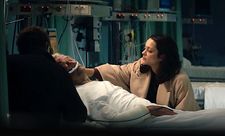 |
| Louis (Melvil Poupaud) and Alice (Marion Cotillard) with their father Abel Vuillard (Joël Cudennec) Photo: Shanna Besson/Why Not Productions |
MP: Exactly! But this is more of a double for Arnaud, this part I have, Louis, in that movie. And maybe the part Mathieu Amalric had in A Christmas Tale. So it’s more like the dark side of Arnaud. The anger, the violence, the fear and also the more fragile part of the character. It’s like a tornado really, this Louis Vuillard, for instance.
AKT: Right from the start, before we even see the opening credits you are so filled with grief and pain and anger. Everything in the first minute.
MP: Yeah, because I think Arnaud for this movie he really wanted to let go everything he had in mind. Maybe to conclude this “Vuillard family section” in his work. So he wants to be straightforward, very intense from the start, not fearing too much drama or too much anger. Maybe he wrote partly during the confinement so for him, like many directors I’ve been working with, this period was inspiring but also, I guess it was so strange and so intense that some people thought that they will maybe not make movies again. Because it was the end of something they had to let go of something.
This movie particularly with Arnaud, maybe in his mind was to be his last film, and he would go very far into this family business and to find a way to make people at ease, to find some peace towards the end of this drama. And that’s what really attracted me to this particular script. It starts, like you said, with a lot of fear, a lot of tension but it goes towards the light, which was not the case in A Christmas Tale. At the end of A Christmas Tale the sister was still full of anger and hatred. And this time they are both more settled, more happy with their life and being able to go back to their life and to the world again.
AKT: You mentioned a kind of jealousy for Mathieu for his previous role. I felt in a way, and I’m thinking of it only right now, that Arnaud was maybe a bit jealous of his last film, because it was Philip Roth’s story. As if he were jealous of his own film and in this one wanted to really bring in everything about him that is disturbing. I mean, that’s the great thing about Arnaud, and I get proof every time I talk with him, he is so much challenging himself, by going where it’s the most dangerous really.
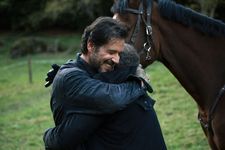 |
| Louis (Melvil Poupaud) gives a hug to Zwy (Patrick Timsit) |
MP: Yes, absolutely. He is full of passion, full of energy. He wants to experiment on set. I think he spends a lot of time writing and his script is always very beautiful. The dialogues are very special. He’s one of the rare directors in France whose style, the way people talk, is not like naturalism. It’s not the same kind of talking but it reminds me of Rohmer who was also very famous for having a special tone with actors. You know they don’t speak the same way in their movie than they do in other movies. So the script was very intense, very beautiful and dark but I knew that during the shooting he would go and maybe understand more of himself filming the scenes.
Having the actors working on the scenes he discovered a lot of himself about what he wrote. About his own drama, maybe trauma. It was beautiful to see him on set experimenting and turning the scenes around until he finds the right solution for the mise en scène. And many times after the shoot he sent me messages or he told me he finally understood what he wrote in the first place. It was for him like discovering his own and what he really had to say.
AKT: That’s great. I mean that’s what art should do.
MP: But in cinema it’s not often the case because it’s such an industry and a shoot has so many people involved and so little time. So not many directors allow themselves to, not improvise, but experiment and try many different ways to do a scene. Sometimes you would be the angry guy in the scene, next stage you would be the soft one and the other one would take the anger. I feel on Arnaud’s set everyone is very focused and very curious to see how the scene is going to turn out. It’s really a big moment of creation
AKT: Alive and not dead.
MP: Yes.
AKT: Then the dead are everywhere and it’s not by coincidence that this is the play, James Joyce’s The Dead, that Alice is performing in. Your character carries the dead son, they all carry their dead. As in the beautiful monologue at the end of James Joyce’s text which is about how we all have our dead that we carry with us. That is also a connection to Mia’s film - living with the dead.
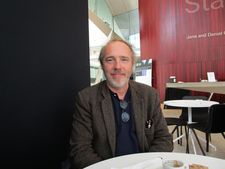 |
| Melvil Poupaud on Arnaud Desplechin: “I feel on Arnaud’s set everyone is very focused and very curious to see how the scene is going to turn out.” Photo: Anne-Katrin Titze |
MP: It’s true. Also both worked on those stories during this shitty period, so I guess it moved around things inside the artist. I noticed that the movies I did since 2020 are very intense and very important to me and I guess some of the best work of those directors. Mia’s film is one of her best, I think, the most personal and well-mastered.
AKT: I agree.
MP: And Arnaud’s film and some other movies I did. It was a dark period but inspiring for some artists.
AKT: And very personal for them. I don’t know how it feels for you when you see that what you are performing for your director is so much of their lifeblood.
MP: I know! That’s what I love. I mean, from the start I always understood that the most gratifying thing when you’re an actor is when a great director such as Eric Rohmer or Arnaud Desplechin or Mia chooses you to incarnate some heroes, sometimes even themself. To me with Eric Rohmer it was like an autoportrait, this Summer’s Tale. And with Arnaud it’s the same. And when Arnaud is filming you he always wants to bring you as high as you can, you know.
And always seeing you as a superhero or a dramatic character from a Shakespearean play. He has the faculty to give you hints to turn your character and your performance into something very cinematographic. Even sometimes with references to American movies from the Hollywood era or some Italian comedy sometimes. So you are traveling through cinema and through his references and he wants you to be as magnified as those heroes he used to like in other people’s movies.
AKT: Were there any specific ones you discussed for Brother and Sister?
MP: You know, I found out I was playing the part of a poet at the end of the shooting. Because poets to me were always very important figures and especially in France those we had in the 19th century. I knew he [Louis] was a writer but at the end he wrote me a little note saying: “Thank you for the work you’ve done, you’re my poet.”
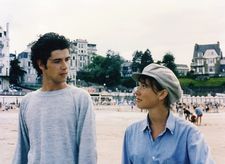 |
| Melvil Poupaud with Amanda Langlet in Eric Rohmer’s A Summer’s Tale |
And I find out it’s true, he gave me the part of those characters, poets, that are so difficult to portray in movies without falling into romanticism or the dark and tormented. Which is also Louis Vuillard. It was a trick to me that he managed to have me playing this poet that I admire and that I sometimes relate to without having this burden to be reaching for so high.
AKT: I was reminded when you arrive at the hospital in that flying scene - the mother is in the bed and your face is so big at the window - it reminded me of a Woody Allen short in New York …
MP: … with the mother in the sky!
AKT: Exactly, the mother in the sky - the reversal!
MP: True! Did you tell this to Arnaud?
AKT: No.
MP: Maybe it’s a reference for him? He’s a big Woody Allen fan, I know. It’s true, that’s what’s beautiful with those kinds of artists. It happened to me a few times in my career to work with people who are so inspired and such great directors that it was not through their mind.
AKT: It is not conscious.
MP: Yes, it’s there and you see those things and it talks to you, but it’s like out of control. It’s like pure inspiration and pure creation. And it’s not always the case with directors.
AKT: Apropos Woody Allen, are you having an upcoming project with him?
MP: Yes, we just finished the movie. In French and shot in Paris. His French movie, maybe his last, but it was a great experience.
AKT: You are finished with it now?
MP: Yes, he is editing the movie back in New York. Yeah, I was very impressed, he’s such a great director. People told me he doesn’t talk to actors, he does one take and he’s moody. It was not at all the case, he was to me very happy to make the movie, filming here in France, giving a lot of indications and having fun turning things around and making new takes, trying to experiment. It was one of the greatest experiences of my life as an actor for sure.
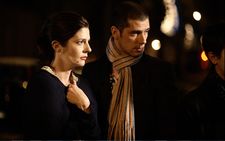 |
| Melvil Poupaud with Chiara Mastroianni in Arnaud Desplechin’s A Christmas Tale |
AKT: Who are your co-stars?
MP: A French actress called Lou de Laâge who is the main part. A young actor that I really like, Niels Schneider, and a French actress who plays Lou’s mother, Valérie Lemercier.
AKT: Arnaud told me you are coming to New York?
MP: Yes, I’m coming on March 1 for a few days, maybe two weeks, and I go to visit some friends in Chicago. I’m coming for the Unifrance festival to present Arnaud’s movie and maybe Mia’s film. No, Mia’s has already been to New York.
AKT: Yes at the New York Film Festival and it just opened here.
MP: They are doing a little retrospective of my work at the FI:AF, French Institute, and I have a masterclass at NYU.
AKT: Then I’ll see you soon in person!
MP: I’d love to. Let’s meet, Let’s have a coffee and discuss our love for Arnaud.
AKT: Thank you for taking the time!
MP: Thank you, see you in New York!
Coming up - Melvil Poupaud on inspiration from Forrest Whittaker in Clint Eastwood’s Bird and Jack Nicholson In Bob Rafelson’s Five Easy Pieces, Grégoire Hetzel’s score, a cowboy movie showdown in the supermarket, contradictions, hungry ghosts, and a very particular smile shared by him and Marion Cotillard.
Brother and Sister screens on Sunday, March 5 at 3:30pm, followed by a Q&A with Melvil Poupaud and on Tuesday, March 7 at 6:00pm at the Walter Reade Theater.
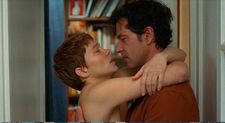 |
| Melvil Poupaud with Léa Seydoux in Mia Hansen-Løve’s One Fine Morning |
One Fine Morning is currently in cinemas in the US.
Unifrance and Film at Lincoln Center’s 28th edition of Rendez-Vous with French Cinema in New York, organized by Florence Almozini and Madeline Whittle, in collaboration with Unifrance, runs from Thursday, March 2 through Sunday, March 12. Rendez-Vous with French Cinema is sponsored by Villa Albertine, TV5 Monde, Maison Occitanie, FI:AF, and Benefit Cosmetics.
Magnetic Melvil Poupaud inside Florence Gould Hall of the French Institute Alliance Française CinéSalon in New York opens on Tuesday, March 7 with a screening of Carine Tardieu’s The Young Lovers (Les Jeunes Amants) at 7:30pm followed by a Q&A with Melvil Poupaud.








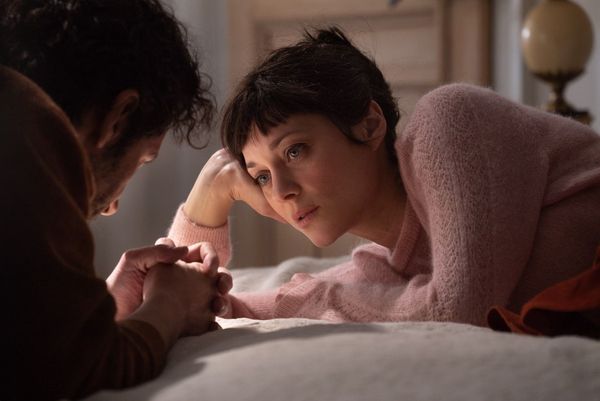
![Melvil Poupaud with Anne-Katrin Titze: “I always understood that the most gratifying thing when you’re an actor is when a great director such as Eric Rohmer or Arnaud Desplechin or Mia [Hansen-Løve] chooses you to incarnate some heroes, sometimes even themself.”](/images/newsite/Melvil_Poupaud_Anne-Katrin_Titze_225.jpg)
